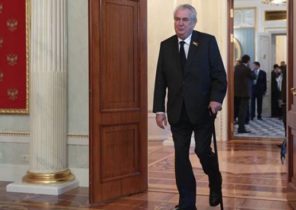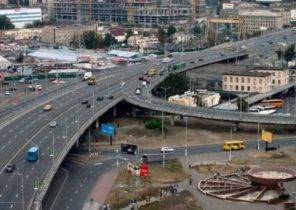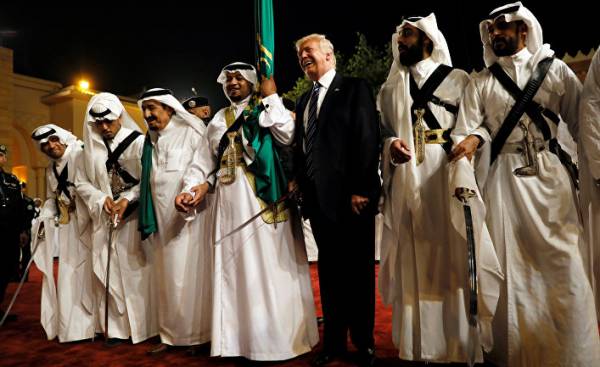
Analysts couldn’t help noting the escalation of the conflict between the coalition of Arab Emirates and Saudi Arabia against Qatar. The question arises: Why at this time, two days after the visit of the President of the United States Donald trump in Riyadh, in particular, after the American-Islamic summit and at the same time, at the moment of exerting pressure on the US to Qatar?
The administration of the tramp facing the pressure within the US, which probably is the Zionist lobby, calling for a review of the Union of the country with Qatar in the light of recent events. We are talking about what the Emir of Qatar recently supported the “Islamic resistance Movement” (Hamas) against Israeli occupation.
The sudden escalation
Over the past two days, it was observed a sudden worsening of relations Saudi Arabia, UAE and Egypt with Qatar, which looks rather far-fetched and false. At the same time, the latter tries to overcome past difficulties in relations with Riyadh and Abu Dhabi.
A false statement
The dramatic events began on Tuesday late in the evening with fabricated statements by the Emir of Qatar. It quickly spread through all of the online resources, Newspapers and TV channels of three countries, for example, Al Arabia in Saudi Arabia, Sky News Arabia in the UAE, private Egyptian satellite channels.
False statement contained statements and arguments about “strained relations” between Qatar and the US administration headed by President trump, and calls Doha to “Egypt, UAE and Bahrain to reconsider its anticatarrhal position.” In addition, it talks about the country’s position on the issue of Iran: “It is a regional and Islamic power that cannot be ignored, and the more to aggravate relations with it”.
Deliberate escalation
Despite the fact that the Qatar News Agency (QNA) and the Qatari authorities were quick to deny the authenticity of the statement, referring to the hacking of the website of the Agency, the channels are Saudi Arabia, UAE and Egypt ignored this message and continued to assess a false statement as if it was real. Moreover, from the first minutes of his appearance, they began to lay out the supporting videos for training which takes a long time, as if they were all made in advance “in the night” one of the Qatari officials.
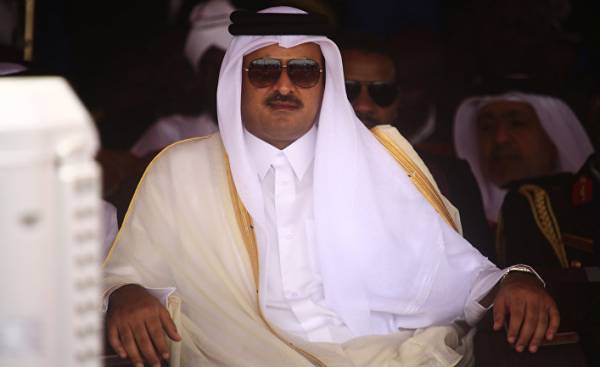 © AFP 2017, Ashraf ShazlyЭмир of Qatar Sheikh Tamim bin Hamad al-Thani
© AFP 2017, Ashraf ShazlyЭмир of Qatar Sheikh Tamim bin Hamad al-Thani
Political escalation
Even the next morning, the middle of the statement by the Emir of Qatar was published in the pages and was mentioned in the media. The attack on Qatar and its leader continues to this day in the way that this escalation is a decision taken at the political level in the UAE and Saudi Arabia. Especially strongly it accused the crown Prince of Abu Dhabi Muhammad bin Zayed, and Deputy crown Prince of Saudi Arabia Muhammad Ibn Salman. Obviously, given the fact that the media involved in the provocations against Doha, one way or another connected with these two persons.
Why now, after the visit of trump?
The aggravation of relations between Egypt, UAE and Saudi Arabia with Qatar, it seems, is intentional, if not well prepared. However, the question arises: why now?
Observers, watching the political developments in the region, noted that this escalation occurred just two days after the leaders of Saudi Arabia, UAE, Egypt and Qatar took part in the Arab Islamic summit. Recall that it took place on Sunday in Riyadh in the presence of Donald trump and a dozen leaders of the Arab and Islamic countries.
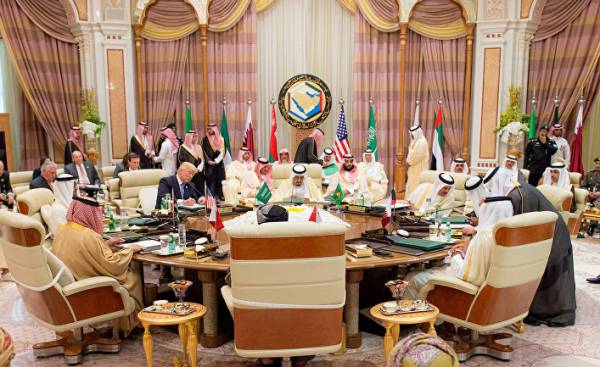 © REUTERS, Bandar Algaloud/Courtesy of the Saudi Royal CourtДональд trump at a meeting with leaders of the cooperation Council for the Arab States of the Gulf in Riyadh. 21 may 2017
© REUTERS, Bandar Algaloud/Courtesy of the Saudi Royal CourtДональд trump at a meeting with leaders of the cooperation Council for the Arab States of the Gulf in Riyadh. 21 may 2017
Is this a summit and personally trump with rising tensions between the coalition of Arab Emirates, Saudi Arabia and Egypt against Qatar?
Hamas and the “Muslim brotherhood”
The answer to this question can be found in an article published by the British newspaper The Guardian on Thursday. The publisher has indicated existing pressure within the United States (probably headed by the Zionist lobby) facing the administration of the trump. They insist on the revision of the Alliance with Qatar in light of recent events, namely the support of Qatar the “Islamic resistance movement” (Hamas) against the occupation in Israel and support the “Muslim brotherhood”.
Given this pressure, The Guardian drew attention to the recent statement of former U.S. Secretary of defense Robert gates in which he criticized the support of Hamas and the “Muslim Brothers” by the government of Qatar.
American pressure
In the same context, the head of the house of representatives Committee on foreign Affairs ed Royce has announced that it will introduce draft legislation, the purpose of which will be the punishment of the countries, especially Qatar, that supports Hamas and the “Muslim Brothers”.
It is possible that the pressure exerted on the US President within the country, reflected in his speech before the leaders of the Arab and Muslim countries in Riyadh, when he ranked Hamas to the list of such organisations, as “al-Qaeda” and “Islamic state” (banned in Russia — approx. ed.).
Consequently, the pressure on trump coincides with the position of Saudi Arabia and the UAE, which saw an opportunity to launch an attack on Qatar. Perhaps this is intended to push the government to revise its position.
Perhaps this kind of “green light” from trump, calling to ease the pressure on his administration, without intervening directly in Union with Qatar, at least given the fact that Doha is home to the largest US air base in the middle East.
What is the secret of the campaign?
The campaign of Saudi Arabia and the United Arab Emirates aimed against Qatar can have the other side. Riyadh and Abu Dhabi are concerned that on some web sites there were first plans and diagrams of the war in Yemen and the horn of Africa (Somalia). In addition, they are concerned about the financial investment of Qatar in the administration of the trump, because they want to its location and the approval of the plans of the crown Prince of Saudi Arabia Muhammad Ibn Salman, the throne and rule after his father.
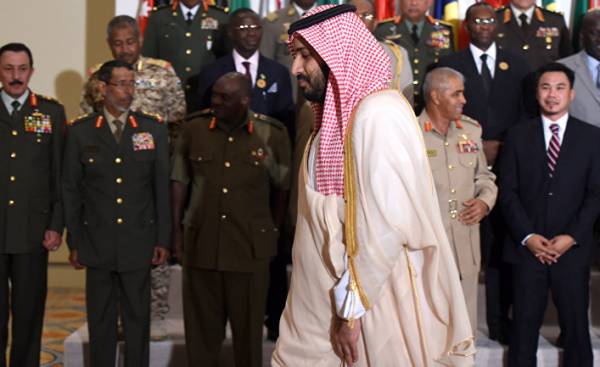 © AFP 2016, Fayez NureldineСын king Salman and the defence Minister of Saudi Arabia Muhammad Ibn Salman al Saud
© AFP 2016, Fayez NureldineСын king Salman and the defence Minister of Saudi Arabia Muhammad Ibn Salman al Saud
As always lately, if Saudi Arabia and the UAE want to suppress any voice of freedom outside their coalition, they will prepare the charges and bind them with Qatar or “Muslim brotherhood”.
Outside the coalition
Thus, it appears that the electronic campaign, which took the UAE and Egypt with the support of the UAE, began a few days before the incident.
In addition, Riyadh and Abu Dhabi have decided that you want to block dozens of sites that broadcast but are not in the coalition, including Al Jazeera.
It should be noted here that the attack on these sites was made at the highest levels from the United Arab Emirates, including from the Minister of state for foreign Affairs Anwar Mohammed Gargash and Deputy chief of police and public security in Dubai Lieutenant Dahi Halfan.
If it shows something, so that the attacked sites have authority and influence, and fear of the UAE before the new media.
“The Separation Of The South”
In addition to the two reasons mentioned above, the observer could easily notice a strong concern of the UAE in the last two weeks for fear of the intervention of Qatar in the plan for “the coup in Aden”, by separating the South and North of Yemen from each other.
Despite the fact that the position of Qatar intersects with Saudi Arabia’s decision to reject the plan, the Kingdom is still concerned that Saudi crown Prince to try to strengthen the relationship with Abu Dhabi.
You need to consider several factors to find possible explanations for the deterioration of relations Saudi Arabia and the UAE with Qatar. Perhaps, soon found new causes that will make the picture even clearer.
According to observers, UAE is afraid that Yemen will be an alternative project, in which Qatar’s role will be much higher and he can carry out his reforms.





